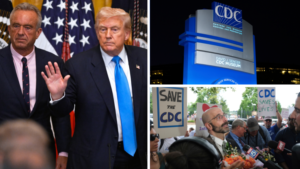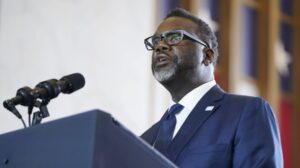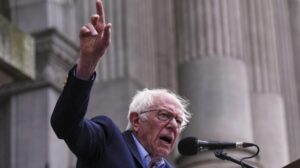Politics
Redistricting tests Trump’s finely tuned influence machine
Donald Trump has strong-arming Congress down to a science. Now his redistricting gambit is putting his methods through a stress test.
It’s a strategy of intensifying levels of private coercion and public threats of consequence, driven by Trump and amplified by aides and allies behind closed doors and through the online MAGA echo chamber: White House visits, calls from the president, online insults and even primary threats.
The more-stick-than-carrot approach has delivered Trump major wins in Washington by helping him barrel through initial GOP resistance to controversial Cabinet picks and a politically perilous policy package in a stunningly short turnaround.
That machine is whirring into gear again as the White House pushes Texas, Missouri and Indiana to gerrymander their congressional districts to protect Republicans’ House majority in the midterms. Vice President JD Vance and top aides have been dispatched to Illinois and staffers have phoned into Missouri. Trump is summoning Hoosier Republicans to the White House next week. Both his political operation and right-wing influencers have begun floating primary challenges.
“These folks are not sitting around thinking about redistricting. But in an instant, Trump can prioritize that issue for them and subsequently he can mobilize them on his behalf,” said Kevin Madden, a Republican strategist who has worked for House GOP leadership and on presidential campaigns. “I think he recognizes that formidable power and he’s willing to apply it far and wide.”
Now that redistricting pressure campaign is providing a significant test of whether the approach Trump has near-perfected within his governing trifecta in D.C. can translate beyond the beltway.
Every president has the power of the bully pulpit, wielding the heft of the Oval Office and inside-the-beltway pressure tactics to advance his agenda. But Trump also retains a uniquely powerful hold over the most enthusiastic voters in the GOP, and is able to leverage the grassroots support of his MAGA movement and Truth Social platform to compound pressure on any resistant Republicans to accede to his demands.
Marrying the two, Trump has a singular strategy that he’s employed to great effect so far this term to compel Republican lawmakers into supporting his appointees and legislative agenda.
There are very few exceptions, in part because Trump has made clear the consequences for dissent. Trump and his team have repeatedly threatened primary challenges for GOP lawmakers who do not bend to his will, going as far as standing up a super PAC that’s raising millions of dollars to target Rep. Thomas Massie (R-Ky.) for voting against the “big, beautiful bill.” And the White House is vetting potential primary challengers to Massie, including Kentucky state Sen. Aaron Reed, who traveled to Washington for a meeting last month, two people familiar with the trip confirmed to Blue Light News.
“Incumbent presidents have broad sway over their party…The only real difference is that Trump will operate with language and threats we haven’t seen from other presidents,” said Doug Heye, a GOP strategist who has worked for House Republican leadership. “He’s more YOLO than lame duck.”
The White House did not respond to a request for comment.
Now Trump and his team are trying their playbook on GOP governors and state lawmakers as they push as many red states as possible into mid-decade redistricting. They are on the cusp of success in Texas, where the Republican-controlled Legislature is imposing a new map designed to net the party five seats.
Missouri Republicans are widely expected to follow suit when they return to Jefferson City in September for their annual veto session — despite still smarting from a knock-down, drag-out redistricting fight just two years ago in which they ultimately rejected drawing an additional GOP district.
While Republicans in the state Legislature are reluctant to revisit the difficult inter-party politics at play, the Trump administration is working to force them to submit anyway, calling up Gov. Mike Kehoe and local lawmakers who have expressed skepticism about the effort.
There’s also a less direct form of pressure at play — one that has guided GOP decision-making throughout Trump’s time as the party’s standard-bearer.
“No one wants to be seen as anti-administration or anti-Trump,” said a Missouri GOP operative granted anonymity to speak candidly about private deliberations. “That does not do anyone any good when they go back to their district.”
But the potential limits of Trump’s pressure-campaign playbook are showing in Indiana, where Republicans are so far resisting a more intensive — and public — push. That includes several GOP state lawmakers who have publicly panned the effort, with one hard-right representative slamming it as “politically optically horrible.”
The White House dispatched Vance and top administration aides to Indiana to pitch the governor and GOP legislative leaders on gerrymandering the map. White House Intergovernmental Affairs Director Alex Meyer, in his personal capacity, hascalled several lawmakers to press them to redistrict. A group called Forward America flooded voters’ phones with robocalls and text messages urging them to call their lawmakers to back the effort. Trump’s political operation is considering primarying lawmakers who refuse to fall in line — a threat amplified by MAGA influencer and Turning Point USA CEO Charlie Kirk.
As the pressure mounted, all seven of Indiana’s Republican representatives in Congress issued a series of rapid-fire statements over six hours on Monday supporting Trump’s redistricting push — a clearly coordinated piling-on of pressure as state House Republicans huddled behind closed doors. The state’s two Republican senators backed the effort the following morning.
But progress remains elusive: Gov. Mike Braun is still undecided on whether to call a special session to advance a new map, and GOP resistance is still flaring from within the state house.
Trump and his team show no signs of letting up, bullish about Republicans’ advantages in the redistricting arms race that has exploded between red and blue states. The administration is planning to court more than four dozen Indiana Republicans — including the state House speaker and Senate president — at the White House next week.
And Trump’s allies believe his ability to get his party to fall in line on his agenda is nearly infinite.
“As Trump has said before: The party is what I say it is,” said David Urban, a Trump 2016 campaign adviser and longtime ally. “And that is largely true.”
Adam Wren contributed to this report.
Politics
Cleveland’s mayor wants Democrats to know millennials like him are impatient and ready to lead
The age of the millennial politician is here — nowhere more obviously than in city halls around the country. Cleveland Mayor Justin Bibb surprised Ohio’s political establishment in 2021 by soaring to victory at the age of 34. The former Obama intern-turned-Key Bank executive is now the president of the Democratic Mayors’ Association and a rising star within the party.
I met up with Bibb — clad in his signature round tortoiseshell glasses and a slim-cut navy suit suit even on a hot and humid Sunday in July. We talked about his city and its relationship with the federal government — from the impact federal cuts may have on his city’s hospital system to his desire to work with Republicans and President Donald Trump on permitting reform.
Over a plate of mac and cheese at trendy Cleveland bistro Luxe, Bibb said that Democrats at large have missed the fact that millennials are impatient — not willing to wait their turn to run for office, deeply entrepreneurial and chomping at the bit to solve the crises they’ve spent their entire lives navigating.
“When I ran for mayor, a lot of folks — a lot of establishment Democrats in the party — told me to wait my turn,” Bibb explained. “We are impatient about this country, because we know what crises look like … because we’ve experienced them firsthand.”
This conversation has been edited for length and clarity.
You’re from Cleveland.
Born and raised in Cleveland. I live in the southeast side, in the Mount Pleasant/Union Miles neighborhood.
I’m not that familiar with Cleveland. So tell me what that means, vibes- or identity-wise.
It’s got a crazy identity in terms of its history. At the height of Cleveland’s prominence — and we were once the fifth largest city in the United States — it was a Jewish middle-class neighborhood. Then you have white flight, redlining, and it became a Black middle class neighborhood.
To this day, there’s still remnants of that. When I was growing up in the 1990s at the height of the crack epidemic in the city, it still had a strong Black middle class, still strong main streets. And one of the reasons why I ran was to try to reverse that decline.
In an interview earlier this year, you mentioned that housing was a policy space where this Congress might make some progress. Have you seen anything helpful since then?
Nothing yet. And what concerns me is that with the passage of this “big beautiful bill,” it’s adding to the deficit, which is going to lead to an increase in interest rates, which is going to lead to an increase in the cost of buying a home.
If there was one space where I think Trump could have some real bipartisan support, it’s around housing. He’s a builder, right?
I think every mayor or governor you talk to wants to see Congress support us on permitting reform at every level of government. And every mayor or governor you talk to wants HUD to streamline regulations so it’s easier to build in America.
Are there other places you see a missed opportunity, where interests align?
I know that the administration is looking at opportunity zones and … childcare tax credits.
And then on immigration reform … The best thing for us to do to be a competitive economy is to pass common sense immigration reform. So instead of all this theater and chaos and this other bullshit, let’s get back to work and let’s find common sense immigration reform. Everybody wants a secure border, but we also need to give people a pathway to citizenship, because if we don’t, we can’t be globally competitive.
You have connections with many other mayors because of the Democratic Mayors Association. Is there any housing policy you’re seeing in other cities that excites you?
A lot of us right now focus on permitting reform. Cleveland will be launching that effort this fall, where we’re streamlining the process to upload your drawings and to get a permit from City Hall.
Really proud of the work that Mayor Todd Gloria has done in San Diego, where he has really worked quickly to decrease street homelessness in the downtown parts of San Diego. That’s declined over 60 percent since he took office.
I look at what Andre Dickens has done in Atlanta, where he has taken old shipping containers and vacant lots and made it a homeless shelter where people have dignity and support to get the second chance they deserve.
What about some of the cuts that have come out of D.C. recently, on education funding or Medicaid. Are you finding any ways to backfill these cuts?
I think every mayor in the country will agree with this: There is no replacement that we can find to plug in the gaps from the federal government.
Cleveland is home to our only safety net hospital, Metro Hospital, and they could go out of business if these cuts go through. What’s striking is that [Trump] worked to put some provisions in this bill with Republican senators to help rural hospitals, but nothing to support urban hospitals. That’s gonna decimate our public health infrastructure.
And residents in Ohio are going to feel any impacts sooner, because Ohio also rolled back state Medicaid expansion — right?
Correct.
The state cuts … will put a further strain on hospitals like the Cleveland Clinic, Metro Health and emergency hospitals. It’s an issue of public safety, because people may be committing crimes out of survival now, because we no longer have a strong social safety net.
All these things are interconnected. It’s easy for the president and Republicans in DC to try to say, “Democrat-run cities are unsafe.” But they’re the ones making our country less safe by passing these uncompassionate, crazy bills.
I totally understand that you can’t replace the federal cuts. But you said at your State of the City address that you were looking for philanthropic avenues to try to help in other ways.
I’ll be convening healthcare CEOs and hospitals, I’ll be convening my foundation leaders, to figure out what we can do to stand in the gap until we get change from the federal government.
One idea is how do we start to promote more preventative care to make sure that folks aren’t getting sick before they need to go to hospital. I’ll be working with Metro Health Hospital, our local social safety net hospital, to get folks enrolled in the exchanges before these changes occur so they can get the care they need. And I have a mobile health clinic that we deploy at my department of public health as well. So all of the above is on the table.
You’re a millennial. What are Democrats missing about millennials?
That we’re impatient.
Say more.
When I ran for mayor, a lot of folks — a lot of establishment Democrats in the party — told me to wait my turn. We are impatient about this country, because we know what crises look like … because we’ve experienced them firsthand — from 9/11 to the great recession to two wars in Iraq and Afghanistan to the pandemic.
But we’re also the most entrepreneurial generation as well.
Follow-up question — though I don’t know how qualified we (millennials) are to talk for them — about Gen Z. In the 2024 election, nationally, millennials stayed the most blue. Gen Z swung toward Trump.
Gen Z sees a rigged system.
But we (millennials) do too, right? Why does it hit different?
I think for Gen Z … they see all the massive amount of wealth being created because of technology and the proliferation of Amazon, Uber, what have you. They don’t understand why we can’t get our shit together and fix this stuff quickly.
They looked to someone like Donald Trump, who is the disrupter, to fix it.
The reason why he’s losing his base on Epstein and the Epstein files is because they thought they could trust him as the disruptor. He would be transparent. We want transparency … and now they’re not getting that.
What do you want Democrats in D.C. to do more of?
Listen to mayors. We are closest to the challenges and the pain of what this federal destruction looks like, but we’re also closest to the damn solutions. We know how to fix America’s housing problem because we’re doing it. We’re fixing public safety in cities like Cleveland, Baltimore, Atlanta. We know how to create good quality jobs with union and labor being a key partner.
The answer to the Democratic Party’s future and problems will not come from congressional D.C. Democrats. It needs to come from America’s mayors and America’s governors.
Your summer playlist — What are you listening to right now?
Drake is solid. I listen to a lot of Jungle, I love Jungle. I’ve been in a classic Jay Z mode too, recently. I feel like Jay Z [and] Memphis Bleak is like my quintessential growing up in this city [in the] summer vibe that gets me in a good mood.
I just sent my barber my [Spotify] day list. It was called “luxury barber shop Sunday afternoon.” And he’s like “Dude, it’s straight bangers.”
You know he’s playing it at the barbershop right now … And they’re like, “this is the mayor’s playlist.”
[laughing] Exactly, yeah.
Politics
Sunday shows preview: Trump administration faces fallout from CDC leadership shakeup
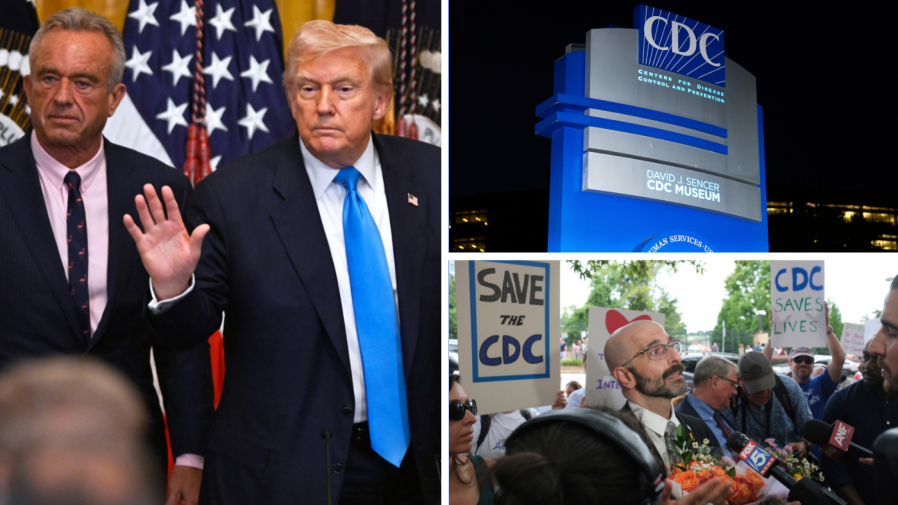
President Trump’s administration is facing fallout from this week’s leadership shakeup at the Centers for Disease Control and Prevention (CDC), where the agency’s director was terminated and other top officials resigned. The president fired Susan Monarez on Wednesday after she clashed with Health and Human Services (HHS) Secretary Robert F…
Read More
Politics
Chicago mayor vows to fight Trump intervention, signs protective order
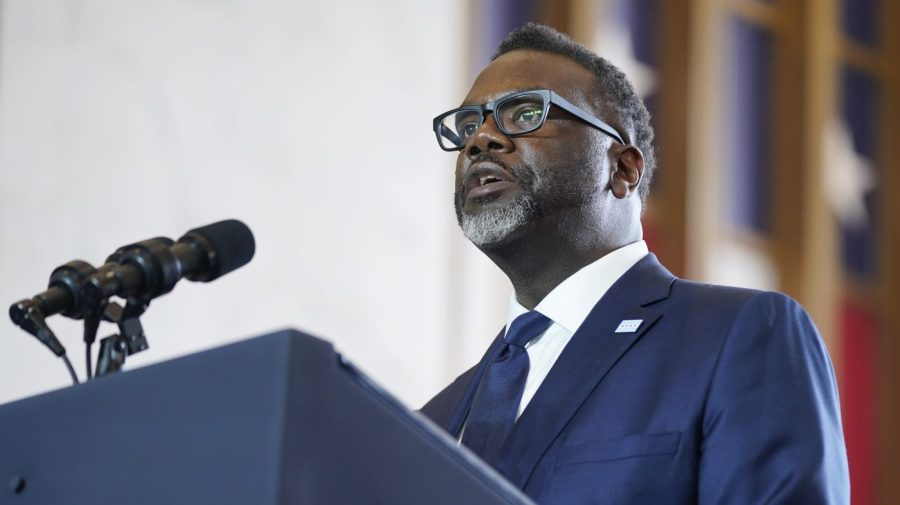
Chicago Mayor Brandon Johnson (D) signed an executive order detailing how the Windy City will attempt to respond to President Trump’s potential deployment of the National Guard. Johnson’s executive order, which he signed on Saturday, established the “Protecting Chicago Initiative” to protect the constitutional rights of Chicago residents amid the “possibility of imminent militarized immigration…
Read More
-
Uncategorized10 months ago
Bob Good to step down as Freedom Caucus chair this week
-

 The Josh Fourrier Show10 months ago
The Josh Fourrier Show10 months agoDOOMSDAY: Trump won, now what?
-

 Politics10 months ago
Politics10 months agoWhat 7 political experts will be watching at Tuesday’s debate
-

 Politics6 months ago
Politics6 months agoFormer ‘Squad’ members launching ‘Bowman and Bush’ YouTube show
-

 Politics10 months ago
Politics10 months agoHow Republicans could foil Harris’ Supreme Court plans if she’s elected
-

 The Dictatorship6 months ago
The Dictatorship6 months agoPete Hegseth’s tenure at the Pentagon goes from bad to worse
-
Economy10 months ago
Fed moves to protect weakening job market with bold rate cut
-

 Politics10 months ago
Politics10 months agoRFK Jr.’s bid to take himself off swing state ballots may scramble mail-in voting


